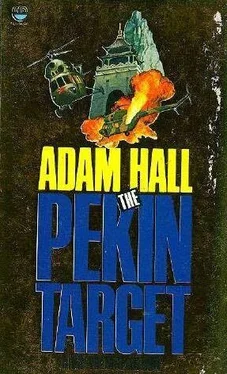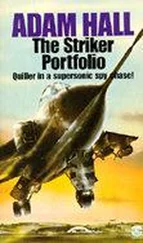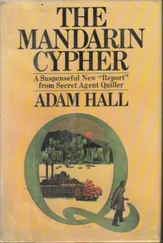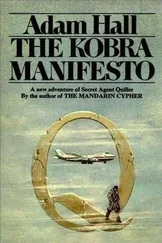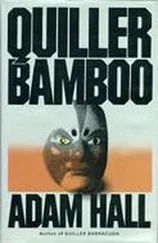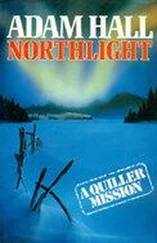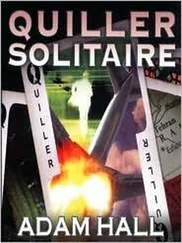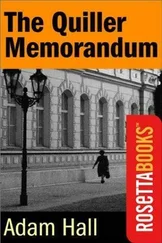I waited again, in shadow; when the guard turned and paced back, towards me, I drew fully into cover and watched the edge of his own shadow flowing in rhythmic patterns cross the uneven flagstones as he came nearer. During the time I'd been watching him he hadn't come as far as the corner of the building here, but he might do it now, and if he did there wouldn't be time to reach deeper cover; I'd have to confront him, and there wouldn't be much chance: his hand was near the trigger of that bloody thing and he'd only have to swing it towards me and there'd be nothing I could do.
I watched his shadow as it neared; his movement was no longer soundless; I could hear the soft wincing of his rubber soles and the faint brushing of his legs as the inner seams of the track suit rubbed against each other. He was so close now that I could smell gun-oil. If he came right to the corner here I wouldn't have time to jump him before he put out some shots, and even if he missed me the sound would bring the others.
Wincing of the rubber soles, smell of oil, and the thought that I shouldn't have taken a risk so big so soon, that being suddenly free had made me overconfident: it was a classic syndrome. His shadow came on, and when an owl called from the belltower my scalp shrank and I drew a breath sharply, and then the barrel of the gun swung in a half circle as he turned and his shadow moved away, flowing across the ones obliquely in front of him and becoming smaller. Then I broke cover and stood there watching his back and judging the distance and the terrain and the state of its surface and its acoustic properties and the number of steps it would need for me to take him down at this precise point and in silence without the heavy gun hitting the stones and alerting the other guards; then I moved back into cover because it was no go; the distance and the terrain and the acoustics were all in my favour but I would have to go for him alone and I couldn't do that, because of the moon; I'd have to take my shadow with me and he'd see it before I was close enough and when I jumped him I'd be jumping straight into the gun, no go.
From here he looked smaller.
A minute ago the owl that had called earlier from the bell-tower had lifted, beating its wings three times and then dropping in a long slow glide to the rocks below the parapet, uneasy about my presence.
The Korean looked smaller because from this height his body was foreshortened, twelve feet or so below where I crouched on the roof of the pagoda. It had taken me some time to reach here, climbing the thick flowering vine and testing each glazed tile of the roof before I put my weight on it. The time was now 12:06 and I was sweating uncomfortably because the gap was narrowing and there was so much to do, yet I mustn't hurry: to hurry would be dangerous.
To delay, also, would be dangerous.
The man below me paced with his gun. All the salient factors were the same now except one. The terrain was the same and from this height I could take him down and even more easily, and do it without the gun hitting the stones if I got the angle right; and now I could do it alone, before he saw my shadow: if I could do it blind. This was my worry now, and it was in the form of a linear pattern: at the precise place where I could most easily drop on him, the moon and my head and the flagstone immediately in front of him would be lined up, and he'd see my shadow. I would have to watch him nearing below me, then move back and wait, judging the time and then dropping at once and almost blind, seeing him only as I went down.
I didn't like that, and the sweat was prickling on me as the watch on my wrist pulsed indetectably; to hurry and to delay were both dangerous, and for the first time since I'd left London I wondered if I were losing my nerve. It can happen, during a chain-action mission when there's no time between phases to relax; stress is cumulative, and these people had been hounding me from the minute I'd seen Sinclair fished out of the Thames eight days ago; stress is also at its highest when there is frequent killing: the theory is that when we go into the field we know we're moving into hazard and we've done it before and we know how to cope and we're ready to kill if we have to, rather than not go home; but in practice it doesn't work like that: when they come at us and we get away with it there's no relief, but just the feeling of Christ, that was close, while the stress builds up in the nerves and that bloody little pest somewhere deep in the organism starts snivelling, we ought to go home now, raising the small and trembling voice that we learn to loathe because we know it's the voice of cowardice, and you can call it caution if you like but we know better — if we'd got any sense of caution in our souls we wouldn't be out here at all.
It's like that when they come at us and we get away with it: there's no relief. And when we've got to go for them and make a killing it's no different, because they are our opposite number and we understand them, sometimes more than we can understand ourselves, and underneath the scaly carapace that shelters us and our conscience we know we're brothers, and when we've got to do it to them we don't do it lightly; we do it with pain, however subdued, and the stress goes on building and there's no relief, just the feeling of Christ, there but for the grace, so forth, it could have been me, and in a way, it was.
Night thoughts.
Ignore.
Death thoughts.
Let them come.
Let 'em come, my brave lads, let nothing you dismay, the bugle's sounding and the flag's a-flutter in the wind, so let 'em come, my boys… but it's not like that any more and it's not like that when you're alone and the notes of the bugle fade and the colours of the flag grow dark in the shadows of night and all you can see is his squat foreshortened body and the barrel of the gun sticking out and the moon's light on his white clown's face as you wait and count off the time and then kick forward from the edge of the tiles, oh come on for Christ's sake it's quite simple but I might have got it wrong as I drop and go down and take my fear with me, ice in the gut, watching his gun, death on my breath, all the way down, all the way down.
Tung Kuo-feng sat perfectly still.
"My son is precious to me," he said in his toneless English. "Our line stems from the Ch'ing dynasty, and he is my oldest."
I said nothing.
"They knew that," he said with his night-dark eyes brooding on mine. "That is why they abducted him."
For an instant I saw a sinuous shadow moving towards him across the flagstones; then it was gone. This time it was not a dream.
The submachine gun lay in the corner of the small ornate room under a folded tapestry he'd taken down from the wall. The body of the Korean guard was among the rocks below the parapet; in the pocket of his tracksuit I'd found some bookmatches and a half-empty packet of cigarettes; they were all the tools I would need.
Tung had asked me nothing, a few minutes ago when I'd called his name through the grilled aperture and said I must talk to him. Seeing the gun and the empty courtyard he knew what must have happened. Now we were sitting facing each other in the lotus position on the Thai silk carpet. I asked him how much he valued his son's life, and he'd answered me.
"There's a chance I can save him," I said now.
"Was there a message?" He meant from Ferris, on the radio.
"There was a message," I said, "from Moscow."
"How do you know?"
He alone here spoke English, the only language he believed I understood. Only he could have told me there'd been a message from Moscow.
"It was the message we listened to in there, last night. It was about Tung Chuan, your son. Remember?"
Читать дальше
